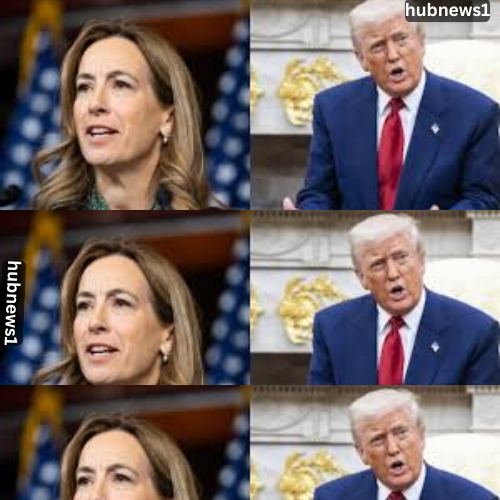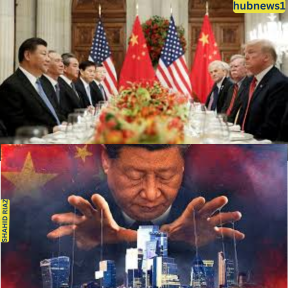
China: says it will fight to the end after Trump threatens 50% additional tariffs
The Commerce Ministry of China stated that it “firmly opposes” the United States. President Donald Trump’s threat to raise tariffs and promised to take countermeasures to protect its own rights and interests.
This followed Trump’s statement that he would add a 50% tariff on U.S. imports of China Wednesday, if Beijing fails to rescind the 34% tariff it placed on American goods last week.
The U.S. threat to raise tariffs on China is a blunder upon a blunder,” the statement read, as translated by CNBC. “China will never agree to it. If the U.S. insists on its own way, China will resist to the end.
China’s Finance Ministry announced last Friday 34% in extra tariffs on everything imported from the U.S., effective April 10, as a response to Trump imposing new tariffs of 34% on China.
READ MORE: Live updates: Global markets plunge on Trump’s tariff turmoil
The across-the-board tariffs came after two earlier rounds of 10%-15% tariffs, which focused primarily on agricultural and energy goods imported from the U.S. The expanded tariff range indicates Chinese leadership’s lower expectations for a trade agreement with the U.S., said Gabriel Wildau, a managing director at Teneo.
Trump’s 34% tariffs on China were added to the 20% duties implemented since February, taking the total new tariffs so far this year on China to 54%. The extra levies have taken U.S. weighted average tariff rate on China to a record high of 65%, and may dent China’s economy by 1.5 to 2 percentage points this year, Morgan Stanley says.
“Because China is already bearing over 60% in tariff rate, it does not matter much if it would increase by 50% or 500%,” said Tianchen Xu, senior economist at the Economist Intelligence Unit, indicating Beijing is ready for a “full on” trade war against the U.S.

“China is being defensive, but essentially the two are probing each other’s limit,” Xu said.
With increased risks of an all-out U.S.-China trade war, Beijing may adopt additional retaliatory actions, including halting U.S. farm purchases, imposing equal U.S. tariffs and additional export restrictions on metals and minerals, Xu said.
China says it will fight to the end after Trump threatenffs
Beijing has already imposed export restrictions on some of the most important rare earth elements, banned exports of dual-use goods to a dozen of U.S. companies, U.S. companies to its “unreliable entities list,” subjecting them to wider curbs while they are operating in China.
The People’s Bank of China on Tuesday established the onshore yuan midpoint rate at 7.2038 per dollar, the lowest level since September 2023, data provider Wind Information reports. The yuan is permitted to trade within a 2% band from this midpoint rate.
Chinese onshore yuan fell 0.33% to 7.3323 per dollar while the offshore yuan remained almost flat.
Escalation is most likely the short-term result, but talks will finally arrive as both sides are touched by the impact of the slowdown in economy,” Xu added.
FAQ:
Q: What did China say in response to Trump’s recent trade threats?
A: Chinese officials stated they would “fight to the end” if the U.S. escalates trade tensions, emphasizing their commitment to protecting national interests.
Q: What prompted China’s strong reaction?
A: Former U.S. President Donald Trump had threatened to impose aggressive tariffs or economic measures against China if re-elected, reigniting fears of a trade war.
Q: Has China faced U.S. trade pressures before?
A: Yes. During Trump’s presidency (2017–2021), the U.S. imposed tariffs on hundreds of billions of dollars of Chinese goods, leading to a prolonged trade war. Negotiations resulted in a Phase One deal in 2020, but tensions persist.
Q: How might China retaliate?
A: Potential measures include tariffs on U.S. exports, restrictions on American businesses in China, or leveraging its dominance in key supply chains (e.g., rare earth minerals).
Q: What’s the global impact of renewed U.S.-China trade tensions?
A: Economies worldwide could face disruptions in trade, inflation, and market instability, as seen during the 2018–2020 trade war.
Q: Is diplomatic resolution possible?
A: China has called for dialogue but insists on “equal terms.” Outcomes may depend on the U.S. administration’s approach post-2024 elections.
bbc,bbc news,news,world news,breaking news,us news,world,america,usa,usa news,india news,US,China,Trump,Trade,Tariffs,Tariff,Stocks,Al Jazeera,Al Jazeera English,Aljazeera,Business and Economy,China,China retaliates,China retaliates tariffs,China tariffs,Donald Trump,Impact of tariffs,Liberation Day tariffs,Tariff War,Trade War,Trump Liberation Day tariffs,Trump imposed tariffs,Trump tariff plans,Trump tariffs,Trump trade war,US,US tariff on China,US tariffs,US trade,US trade policy,US trade tariffs,US trade war,United States,Xi Jinping,china us tariffs,china us trade war




